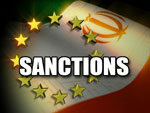 New York Times: Iran sought on Tuesday to rebut assertions that Western sanctions had paralyzed the Iranian economy and severely weakened the currency, pointing to new data from the International Monetary Fund forecasting an economic rebound and lower inflation in 2013. The New York Times
New York Times: Iran sought on Tuesday to rebut assertions that Western sanctions had paralyzed the Iranian economy and severely weakened the currency, pointing to new data from the International Monetary Fund forecasting an economic rebound and lower inflation in 2013. The New York Times
By RICK GLADSTONE
 Iran sought on Tuesday to rebut assertions that Western sanctions had paralyzed the Iranian economy and severely weakened the currency, pointing to new data from the International Monetary Fund forecasting an economic rebound and lower inflation in 2013.
Iran sought on Tuesday to rebut assertions that Western sanctions had paralyzed the Iranian economy and severely weakened the currency, pointing to new data from the International Monetary Fund forecasting an economic rebound and lower inflation in 2013.
The new data in the monetary fund’s twice-yearly World Economic Outlook report came during a virtual news blackout in Iran about trading in its currency, the rial. This month, the rial plunged against the dollar in a wave of foreign-exchange selling by many Iranians who were worried that the value of their savings in rials was shriveling.
The Iranian authorities, which have called the currency plunge part of an economic war against the country by the United States and other Western powers, have since cracked down on black-market trading in the rial and have limited currency transactions to authorized dealers at artificially fixed rates.
The monetary fund report, released on Monday, projects that Iran’s gross domestic product will shrink 0.9 percent this year but grow 0.8 percent next year. The data also project that Iran’s inflation rate will fall to 21.8 percent next year from 25.2 percent this year.
Iran’s official Press TV news Web site and semiofficial Fars News Agency seized on the data, saying they showed that the country was not only coping with the economic sanctions imposed on its oil and financial operations but was growing despite those obstacles. A Press TV headline said, “Iran will win battle against West sanctions: IMF.”
A monetary fund spokeswoman, Wafa Amr, said it had calculated the Iran data before the Iranian currency plunged in value this month.
But even when accounting for that change, private economists said the monetary fund’s report appeared to rely at least partly on what the Iran government considers the rial’s valid exchange rate and the inflation rate in the country.
“I don’t know what they’re looking at, but they’re not looking at the right things,” said Steve H. Hanke, an economics professor and currency expert at Johns Hopkins University and a senior fellow at the Cato Institute, a conservative research group in Washington, who has been following the rial’s weakening against the dollar in black-market trading over the past few years as the Western sanctions have intensified.
“Things were getting worse, worse, worse, and the I.M.F. should have known,” Mr. Hanke said.
By his calculations, Iran’s inflation rate has skyrocketed to 196 percent because of the rial’s diminished value, which has sharply increased the price of imports and other goods in Iran.
Other signs of increased economic isolation have emerged in recent days because of the sanctions, imposed to pressure Iran over its nuclear program. Iran says the program is for peaceful purposes, but Western nations suspect it is a guise to achieve nuclear weapons capability.
Denmark’s Maersk Line, the world’s largest shipping container company, said Tuesday that it was ending all port calls to Iran, having already suspended them for the most part. “This is a pragmatic decision based on an assessment of balancing the benefits of doing limited business in Iran against the risk of damaging business opportunities elsewhere, particularly the U.S.,” Reuters quoted a Maersk spokeswoman as saying.


